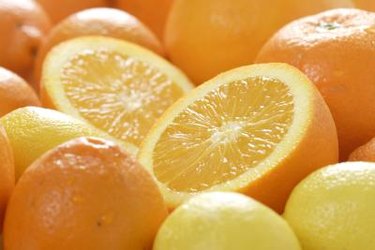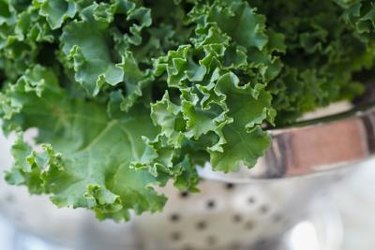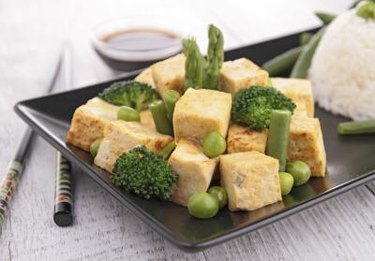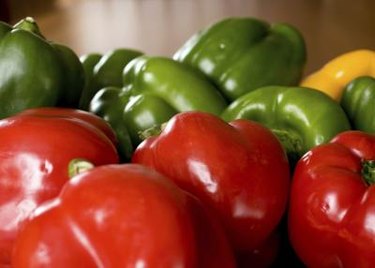
Connective tissues are fibers that are made up of proteins and sugars. These fibers surround organs and help maintain muscle form. Tendons and ligaments, which connect muscles to bone at your joints, are also connective tissues. Certain conditions, such as fibromyalgia, lupus and arthritis, may cause inflammation and degradation of connective tissues. Minerals and vitamins may help repair damage and reduce inflammation of these tissues.
Vitamin E
Video of the Day

Vitamin E is stored in the fat tissues of your body. This vitamin is an antioxidant, and may help prevent connective tissue damage caused by free radical molecules and oxidized low-density lipoproteins, according to Phyllis Balch, author of "Prescription for Nutritional Healing." Vitamin E may also improve your body's production of collage, which helps repair and strengthen connective tissue. This vitamin is found in sunflower seeds, almonds, eggs, asparagus, avocados and kale. You need 15 milligrams of vitamin E each day.
Video of the Day
Zinc

Zinc is primarily known for its role in stimulating immune system function -- this trace mineral may help prevent connective tissue degradation caused by bacterial and viral infection. Like vitamin E, zinc is an antioxidant. Zinc may also encourage the production of collagen, according to a test tube study, conducted by researchers at the Andong National University, and published in "Nutrition Research and Practice" in 2010. The collagen-stimulating effects of zinc may help strengthen bones and reduce fracture risk. Lentils, pumpkin seeds, sardines, tofu, lamb, oysters and mushrooms are abundant sources of zinc. Women and men have different zinc requirements -- women need 8 milligrams daily, while men need 11 milligrams.
Copper

Copper is a trace mineral that is necessary for the production of hemoglobin, a component of red blood cells. This mineral improves production of myelin, which surrounds nerve endings to prevent toxic damage. Copper may also improve the strength of connective tissue -- it enhances production of collagen for connective tissue repair, according to the University of Maryland Medical Center. Copper also works in conjunction with vitamin C to produce elastin, a protein that improves the flexibility of connective tissue. Boost your copper intake by consuming foods such as hazelnuts, almonds, tomatoes, soybeans, crab meat and pistachios. Consume at least 900 micrograms of copper daily.
Vitamin C

Vitamin C is known as immune system stimulating vitamin -- it may increase white blood cell production to help fight off infection caused by fungi, viruses and bacteria. It may also increase interferon production, which also helps fight infection, according to Balch. Vitamin C may also help reduce inflammation of connective tissue and may reduce muscle and joint pain and stiffness. Citrus fruits, spinach, kiwi fruit, cantaloupe, bell peppers and papayas are abundant sources of vitamin C. A diet rich in produce makes it easy to reach the 75 milligrams recommended for women and 90 milligrams recommended daily for men.
- "Nutrition Research and Practice"; Zinc May Increase Bone Formation Through Stimulating Cell Proliferation, Alkaline Phosphatase Activity and Collagen Synthesis in Osteoblastic MCT3T3-E1 Cells; H.J. Seo, et al.; October 2010
- University of Maryland Medical Center: Copper
- University of Maryland Medical Center: Vitamin E
- University of Maryland Medical Center: Zinc
- University of Maryland Medical Center: Vitamin C (Ascorbic Acid)